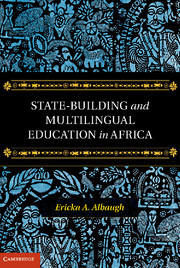Description
State-Building and Multilingual Education in Africa
Author: Albaugh Ericka A.
This book explains why many governments in Africa are including African languages alongside European languages as media of instruction in elementary schools.
Language: English
Subject for State-Building and Multilingual Education in Africa:
Approximative price 104.06 €
In Print (Delivery period: 14 days).
Add to cart
State-Building and Multilingual Education in Africa
Publication date: 04-2014
Support: Print on demand
Publication date: 04-2014
Support: Print on demand
Approximative price 36.76 €
In Print (Delivery period: 14 days).
Add to cart
State-Building and Multilingual Education in Africa
Publication date: 07-2015
Support: Print on demand
Publication date: 07-2015
Support: Print on demand
Description
/li>Contents
/li>Biography
/li>
How do governments in Africa make decisions about language? What does language have to do with state-building, and what impact might it have on democracy? This manuscript provides a longue durée explanation for policies toward language in Africa, taking the reader through colonial, independence, and contemporary periods. It explains the growing trend toward the use of multiple languages in education as a result of new opportunities and incentives. The opportunities incorporate ideational relationships with former colonizers as well as the work of language NGOs on the ground. The incentives relate to the current requirements of democratic institutions, and the strategies leaders devise to win elections within these constraints. By contrasting the environment faced by African leaders with that faced by European state-builders, it explains the weakness of education and limited spread of standard languages on the continent. The work combines constructivist understanding about changing preferences with realist insights about the strategies leaders employ to maintain power.
1. Introduction; 2. Language and education in Africa under mission and colonial influence; 3. Language choices in independent African states; 4. Opportunities for policy change: ideas, materials, and advocacy networks; 5. Incentives for policy change: ruler strategies for maintaining power; 6. Language, education, and 'democratization' in Cameroon; 7. Language and contention - violence and participation in contemporary African politics; 8. Conclusion; Appendix A; Appendix B.
Ericka Albaugh is an Assistant Professor in the Department of Government and Legal Studies at Bowdoin College. She received her PhD in Political Science from Duke University and her MA from the Fletcher School of Law and Diplomacy at Tufts University. Her BA is in International Relations from Pepperdine University. Her articles have been published in the Journal of Modern African Studies, International Studies Quarterly, and Democratization. She has received major fellowships from the Pew Foundation, the Social Science Research Council, and the Spencer Foundation. She has conducted extensive field research in Cameroon, Senegal, and Ghana. Prior to graduate work, she worked for World Vision.
© 2024 LAVOISIER S.A.S.



